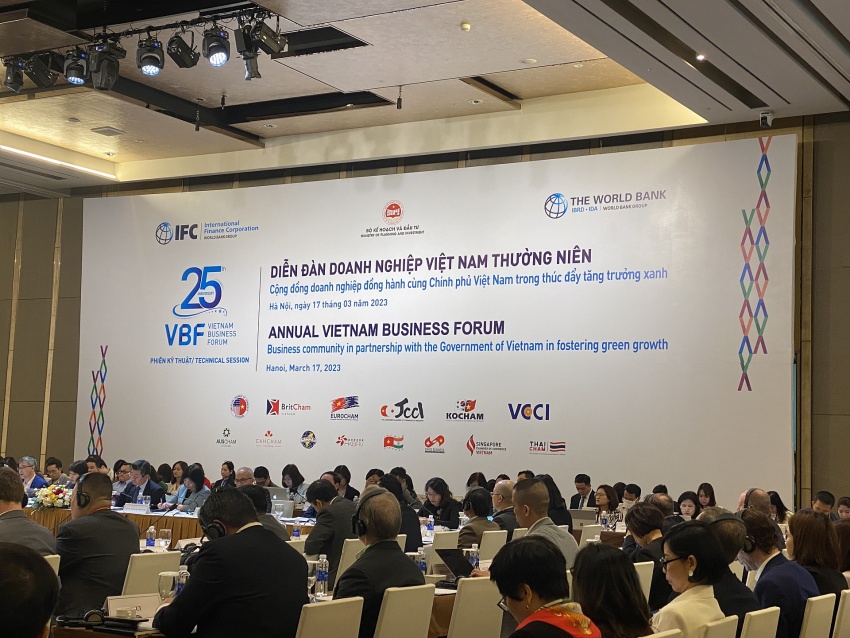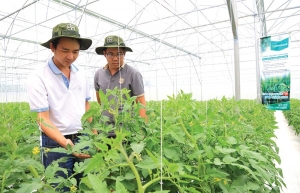VBF: Agribusiness working group recommends digital transformation
 |
| VBF: Agribusiness Working Group recommends fostering digital transformation |
This was the recommendation of David Whitehead, head of the Vietnam Business Forum's (VBF) Agribusiness Working Group, within the framework of the annual BVF dialogue in Hanoi today.
According to the working group, in 2022, the global agricultural sector faced many challenges such as high prices for raw materials, the effects of the Russia-Ukraine conflict, the production protection policies of some countries, and stricter import requirements.
Thus, in Vietnam and throughout the world, the sector needed to re-invent itself. New ideas, smart concepts, new farming models, innovation, digitalisation, more efficient logistics, and a greater focus on circular agriculture and environmental responsibility needed to be addressed.
In Vietnam in particular, the reformation become more necessary because the country is diversifying its export markets for agricultural products. It is expected that in 2023 and subsequent years, stricter market requirements will force the sector to be more innovative, adaptable, and able to identify opportunities to build a sustainable agricultural industry with emphasis on environmental responsibility and circularity.
Vietnam made commitments at COP 26 to ensure production growth, protect the environment, build sustainable agriculture, and to join the global value and food chains. Such commitments must result in specific actions from producers, crop farmers, fish farmers, and foreign-invested enterprises involved in the sector.
As representative for the Agribusiness Working Group, Whitehead said, “Vietnam has been promoting digital transformation in many fields, of which, agriculture is a priority. But with increasing requirements in the export market, Vietnamese agriculture must increase its competitiveness and adapt to new conditions by applying smart technology to production.”
However, according to the working group, the government's goal of recovering economic development in the agricultural sector will face further hurdles. It also faces obstacles from other areas, including crop and animal diseases, climate change, natural disasters, drought, and saltwater intrusion – all which continue to negatively affect production.
To help the nation and the Ministry of Agriculture and Rural Development to develop circular economy solutions to minimise waste and environmental damage, while increasing productivity and shortening the supply chain, the Agribusiness Working Group is willing to support efficient water use and wastewater management along with the minimisation of waterway and wetlands salination – particularly in the Mekong Delta.
“The working group will monitor climate change and its effect on weather patterns, develop smart agricultural systems through digital transformation, and track the production of clean and hygienic food,” Whitehead said.
“There is an opportunity for foreign agribusiness investors to take a leading role in smart, efficient agricultural technology and methods, and to realise the benefits of waste and pollution control and water use management,” he added.
 | Agriculture remains backbone of Vietnamese economy Duong Manh Hung, director of the Agriculture, Forestry, and Fisheries Statistics Department, under the General Statistics Office, said although Vietnam strives to be a country with a modern industrial base and upper-middle income status by 2030, agriculture has always remained the backbone of the national economy. |
 | IFC and BaF sign investment agreements On February 23, the strategic partnership announcement and signing ceremony of investment agreements between the International Finance Corporation (IFC) and BaF Vietnam Agriculture JSC took place at Vinpearl Landmark 81. |
 | Positive goals set by livestock groups Many large-scale livestock companies plan to implement significant projects in 2023, a year in which the sector is widely tipped to recover. |
 | Agriculture can be driver to attract overseas funds Vietnam is expanding international cooperation as an effective solution to reach its target of attracting $25 billion in foreign investment in the agricultural sector by 2030. |
What the stars mean:
★ Poor ★ ★ Promising ★★★ Good ★★★★ Very good ★★★★★ Exceptional
Related Contents
Latest News
More News
- A golden time to shine within ASEAN (February 19, 2026 | 20:22)
- Vietnam’s pivotal year for advancing sustainability (February 19, 2026 | 08:44)
- Strengthening the core role of industry and trade (February 19, 2026 | 08:35)
- Future orientations for healthcare improvements (February 19, 2026 | 08:29)
- Infrastructure orientations suitable for a new chapter (February 19, 2026 | 08:15)
- Innovation breakthroughs that can elevate the nation (February 19, 2026 | 08:08)
- ABB Robotics hosts SOMA Value Provider Conference in Vietnam (February 19, 2026 | 08:00)
- Entire financial sector steps firmly into a new spring (February 17, 2026 | 13:40)
- Digital security fundamental for better and faster decision-making (February 13, 2026 | 10:50)
- Aircraft makers urge out-the-box thinking (February 13, 2026 | 10:39)

 Tag:
Tag:
















 Mobile Version
Mobile Version